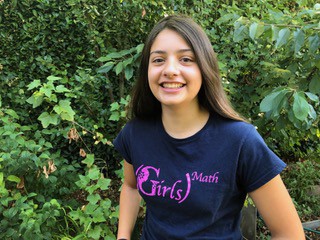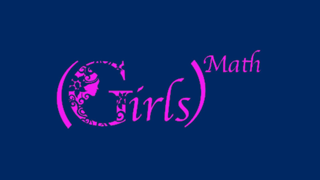Girls to the Power of Math
Back to Posts
Girls to the Power of Math
By Alexa Bailey
Who am I?
My name is Alexa. I’m going to be entering Grade 9. There are lots of things that I love to do. I have a passion for photography, I play softball, and I am part of a fiddle club. I have also always loved math.
However, I’ve always found the classes slow and repetitious. I was in about Grade 2 when I started feeling bored. The pace was very, very slow, and it never really got better. I complained to my parents and they tried meeting with the teachers. Nothing really changed in class.
To help challenge me, my mom introduced the Caribou Contest to my school. She came in to do the contest for whoever wanted to participate. The contests, which happened six times a year, were fun, but classes were still slow.
In Grade 5, my parents went again to my teacher who seemed confused that I could be good at math. The teacher set challenge questions which were provided to the fastest students (the boys). I, on the other hand, did not get to access the challenge questions because I was slowed down by my classmates who asked me to help them understand.
In Grade 6, the teacher asked the class to guess who got the highest grade on the math test. Every boy in the class was named but not one girl. My classmates were all surprised when it turned out that I was the one with the highest mark.
Even this year in High School, I met up with battles. I chose a school that offered a Mini program with accelerated math. Despite this, I found the progress in math too slow for me. I asked to challenge Grade 8 which I passed and then I passed Grade 9 online. After that, I went on to grade ten, by that time I only had six weeks to get through the course, but I did it. In spite of all of these hurdles, I still like math. What about the girls who do not have the same level of confidence or ability as I do? Would they have persisted?
Tutoring
All of that helping others while the boys were accessing the challenge questions, turned out to be a great thing. I learned that I was pretty good at explaining math.
In sixth grade, I started tutoring my neighbour in math. At first, she wasn’t very interested. It was her parents’ idea and it felt like a chore to her. But, as we worked together I started to use fun math-based games and she started to like it more and even looked forward to our sessions. She started to enjoy math and her confidence increased. All these experiences led me to do my Science Fair on math and confidence.
Finding a Mentor
I knew that there was a gender gap with more males choosing STEM-related studies than females. I also read that there was this difference even though there is no gender difference in ability.
I decided to investigate whether gender influences confidence in math. As this was a pretty complicated project, I set out to find a mentor. I Googled people who do work in Gender and Mathematics/STEM and emailed as many as I could find. I emailed researchers Canada-wide.
I was super excited when Dr. Toni Schmader responded and agreed to be my mentor. Dr. Schmader is a Canada Research Chair in Social Psychology at the University of British Columbia. She read over my questionnaires and made some minor tweaks. She also helped me with my statistical analyses.
I wanted to make it as easy for her as possible to mentor me. I was very organized with my questions and I was careful to be considerate of how much of her time I needed. She told me that she had never had a mentoring experience quite like it. I think that was a compliment!
I feel I was super lucky to have had Dr. Schmader as a mentor. She invited me to a lecture at the lab and gave me a beginning understanding of statistics. I felt comfortable asking her questions and she told me that many of our conversations were very similar to those that she had with her university students.
Dr. Schmader also introduced me to Dr. Andy Baron, one of her colleagues. Dr. Baron will be helping me to evaluate my intervention program (more about that later).
My Study
I knew what I wanted to ask and I knew who I wanted to survey. I wanted to survey all of the elementary grades including Kindergarten. This meant that even the non-readers had to be able to understand my questions and answer them. I kept the questions simple and used visuals to help them pick their answers. Here is a sample question:
I am good at math:
- Strongly disagree
- Disagree
- Agree
- Strongly agree
All questions were read aloud by a teacher. I asked questions about confidence in timed tasks, reading, math, doing puzzles, and general academic confidence. I looked at whether the gender of teachers influenced the student’s confidence. I also asked if the students thought their teacher was good at math. It was a huge organizational task to get people to complete the survey.
First, I had to find a school. I approached the principal at David Livingstone Elementary. The principal was keen but told me that I’d have to present my study to the teachers. He asked if I would come back at lunch that same day and present to the staff. I was super nervous but I managed to convince the teachers to participate. Livingstone provided nearly 200 responses, from Kindergarten to Grade 7. I am very appreciative of the support of Livingstone’s staff and students.
When I went back to Dr. Schmader and we did the statistical analysis, we found a statistically significant result that girls became less confident in math as they progressed through elementary school. I asked Dr. Schmader what kind of sample size I would need to get some more definite answers about when this occurs. She told me about 100 more students would give me enough statistical power. I approached some more schools. Simon Fraser Elementary was also super supportive. A couple of classes from Wolfe Elementary also participated which gave me about 300 responses in total.
Major Findings
The results of my study showed that there was a statistically significant loss of confidence in math amongst elementary school girls as they grow older. Girls show a distinct loss in confidence by about Grade 6. Girls did not show any loss of confidence in any of the other domains I tested. Boys showed improvement in their confidence in reading over time, and a stable confidence in math.
My findings are consistent with previous research that has shown that girls become less confident in math, particularly in later grades (Daigle and Guiomard, 2011). This lack of confidence may contribute to fewer girls pursuing STEM-related fields in post-secondary. This is the first research that has been done on the subject in Vancouver.
Disappointment at the Vancouver School Board Science Fair
You will remember that I was doing my research as part of my Science Fair. I won at the school level and went on to the Vancouver School Board finals. There, I lost out to the prettier posters. I didn’t make straws out of raspberry puree or look at the reaction of jellyfish to light. Mine was a boring old study.
The comments of the judges included, “This research is not novel” and “She should show more understanding of statistics.”
Good thing I didn’t believe a word they had to say. I want to shout out to the world, “Science doesn’t have to be pretty. Actually, it is very often tedious and messy.”
Moving Evidence into Action
So, now, I had evidence that girls’ confidence in math declines through elementary school. I found this worrying and I wanted to do something about it. To get started I needed some help.
I set out to find a grant that would help me to get supplies and t-shirts for the program. SCWIST generously gave me their support (and continues to do so).
The plan is to have a ten-week program. To start with I want to focus on multiplication, including skip counting, grouping and similar skills. The focus will be on fun. I want the girls to enjoy themselves while also learning math.
Some activities that we will do are: skip counting with skip ropes, multiplication bingo, hopscotch and more. These days people like to use the term STEAM rather than STEM, where the extra A stands for Arts. There is no gender gap identified in Arts, but in any case, I want to assure everyone that we will be using lots of Artistic creative juices making up songs and games to learn math. I also want to point out that there was a lot of “A” that went into creating the Girls to the Power of Math logo.
Next Steps
I am now going to start the program at Livingstone Elementary in Vancouver. With the help of Dr. Andy Baron, I will evaluate the effectiveness of the program. I had a bunch of t-shirts made and I hope to sell them, putting the money back into the program, to provide supplies and t-shirts to mentors.

Hopes and Dreams
I hope that this program can grow (exponentially). I hope that this program will boost girls’ confidence and that they will start to love math. I really hope to see more positivity around girls and math.
I am starting a website so that I can share resources with anyone who would like to start their own Girls to the Power of Math Program. Maybe, one day, we’ll have a Girls to the Power of Math mentoring program linked to every elementary school in Canada.
Keep in touch
- Have your own STEM dream you’re hoping to make into a reality? Apply for our Youth Leadership Award! You could receive $1000 to create a project of your own design to promote careers in STEM.
- Stay up to date with all the latest SCWIST news and events by connecting with us on LinkedIn, Facebook, Instagram and X, or by subscribing to our newsletter.